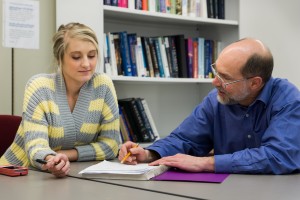According to the American College Health Association’s survey of college students, the one greatest health obstacle to college students’ academic performance is academic stress. The key to avoiding high anxiety and stress-related problems is to identify and treat its source. Below are some tips and resources to help students manage academic stress.
9 Tips for Academic Success
 Use these tips and techniques to improve your academic performance and optimize your learning experience.
Use these tips and techniques to improve your academic performance and optimize your learning experience.
1. Attend classes regularly
Remember that no one makes you attend class, but with College’s fast paced environment, you miss valuable information if you skip a class session, making catching up more stressful.
2. Get to know your instructors and TAs
TAs and instructors are here to help you and want to see you succeed. Find out your instructors’ office hours and plan to visit at least once when the semester begins.
- Introduce yourself and establish direct contact so you’ll feel more comfortable going to your instructors with questions or problems. Being able to speak to an instructor and ask for help when needed is crucial to being successful.
- Making bonds with your professors will allow you to have connections in the department. This will aid you when if comes time for getting letters of recommendations for applications as well as opening the door to have an “advisor” for the class/ department you are in.
 3. Get to know your academic advisors
3. Get to know your academic advisors
To find academic advisors by department or program, contact your department. To find academic advisors by college, contact your college.
Academic advisors can:
- Direct you to specific resources on campus.
- Help you explore different majors and career paths.
- Assist you in choosing courses each semester.
- At Truman, once you have selected a major, you will get an academic advisor in that department. Visiting with them each semester will help ensure you are on track. Your advisor can also aid you in your major classes, should you need help.
- If you have more than one major, on your own, find a “secondary advisor” in each major along with your primary academic advisor. This other advisor will not be assigned to you, but it is crucial to have someone in each department you are studying in that knows the degree.
4. See if your department offers free tutoring
Many departments provide free tutoring or study programs to students:
- Truman State University offers free tutoring for all courses. You can find these services in the Center for Academic Excellence in Kirk Building.
- Check the list of tutoring resources by subject to see if there’s help offered for your particular class or department.
- Ask your instructor, TA, or department head about available tutoring programs.
- Visit the department’s website or bulletin board to see if regular tutoring or study table sessions are offered.
5. Get some sleep
Pulling all nighters are not beneficial to your academic success and stress levels. Though it may seem that staying up all night to “cram” for a big exam will help, getting some sleep the night before a test will lead to better results. Study hard for a big test two nights prior to taking it, so the night before you can get a good nights rest.
6. Schedule adequate study time for each of your classes
Plan to spend a minimum of 2 hours studying outside class for each hour you spend in class. For example, if you attend 12 hours of class each week, plan for at least 24 hours outside class to study. You know your study habits better than anyone. If you need a quiet place to be free from distractions find a table in your dorm’s study bubbles- or head to Pickler Library for some good, quiet study time.
7. Take notes, and use them wisely
Taking notes is one of the most important strategies to help you fully comprehend the information provided in each class lecture, fix the information firmly in your memory, and discover the concepts you don’t fully understand. Try not to just copy down the powerpoint, but put concepts in your own words as you learn about them in class. This will help you have a greater understanding of the topic and aid in studying later, since it is easier to remember something you have written personally.
- If you have to miss class, ask someone to take detailed notes for you and recopy them into your own words and notebook as soon as you return to class.
- Go over notes with a friend when studying- each student will have taken something different away from the lecture. Having more than one person studying together can be beneficial to fully understand a topic.
8. Participate in some athletic activity as a “study break”
Students who participate in athletics are found to have lower stress levels than those who do not. As a study break join an intramural team, go to the student rec., or even find a fun video online and work out to that.
9. Journal your fears/ anxieties about Academics
Research has shown that when students write about their thoughts and feelings about an upcoming test immediately before they take the test can lessen the negative impact of pressure on performance.
Truman Resources
Need a little extra guidance for academic success? These campus resources can help you.
- MAC Tutoring: One of our most beneficial academic services is the MAC Tutoring Program, a collaboration with the Center for Academic Excellence. The trained, one-on-one tutors are offered free of charge to Truman students who need assistance in many subjects–you can find a list of the subjects we cover here, or just visit Kirk Building 110 or the MAC to see the current schedule.
- Advising Center: Center for Academic Excellence Academic Advisors assist with registration and academic planning, but we can also help with any of your questions about Truman, higher education, and the transition from high school to college to the rest of your life. We understand that your academic life isn’t separate from your family and social life, your campus living arrangements, your physical and psychological health, your spirituality, and your past experiences as a student. All of these factors connect and influence each other. Contact us for campus information and resources.
- The Writing Center: Located on the first floor in the Kirk Building (KB 120), the Writing Center offers resources to students regarding class papers. Students can receive help at any stage of the paper writing process from brainstorming to final edits on any paper or subject matter. Making an appointment is easy, and the services are valuable. This service is free to Truman students and is a great resource to make sure your papers are “college” quality.
